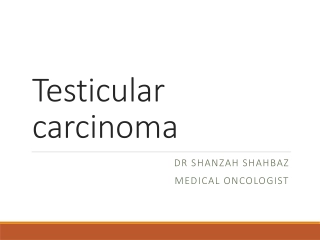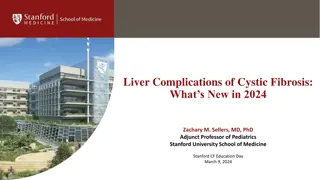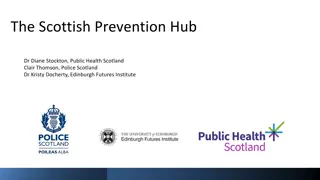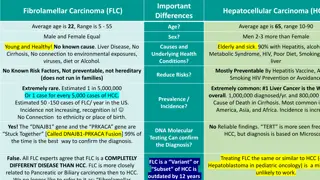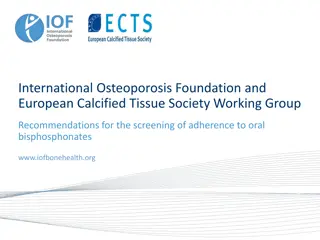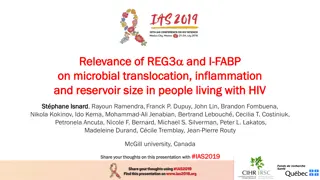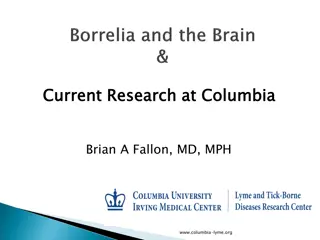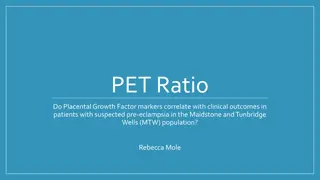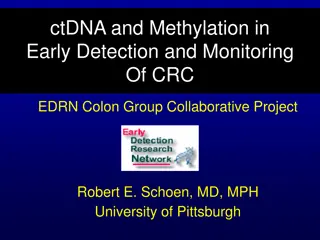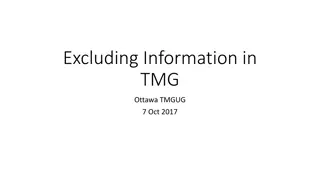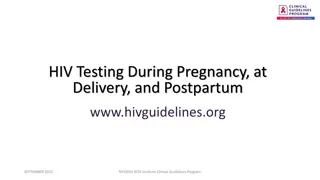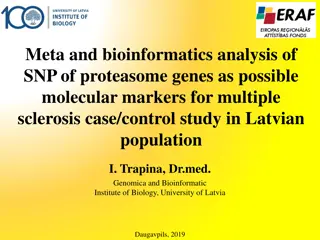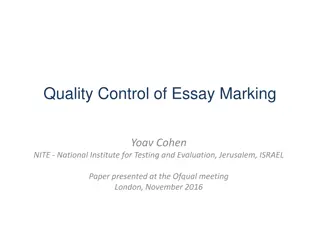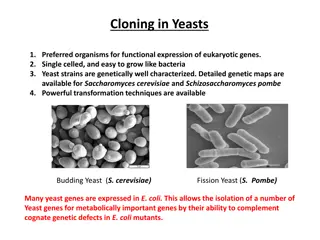CSTL: Inclusive Education Framework for Teacher Wellbeing & Safety
Explore the Care and Support for Teaching and Learning (CSTL) framework, its pillars, and revised action areas that promote inclusivity, teacher wellbeing, safety, and security. Discover the markers for teacher wellbeing and the Department of Basic Education's contributions, including advocacy mater
8 views • 14 slides
Testicular carcinoma
The diagnosis and treatment options for testicular carcinoma from Dr. Shanzah Shahbaz, a medical oncologist. This comprehensive guide covers staging, tumor markers, false elevation risks, chemotherapy regimens, and management of residual masses.
2 views • 15 slides
Understanding Shock: Causes, Symptoms, and Stages
Shock is a critical condition caused by an imbalance between cellular oxygen supply and demand, leading to organ dysfunction. Compensatory responses include increased heart rate, vasoconstriction, and hormonal adjustments. Recognizable features of shock include tachycardia, hypotension, cool clammy
3 views • 27 slides
Understanding Liver Complications in Cystic Fibrosis: Latest Insights for 2024
Liver complications in cystic fibrosis (CF) have gained importance due to CFTR modulators impacting liver health. This presentation by Dr. Zachary M. Sellers delves into new definitions for CF liver disease, CFF recommendations for screening, management, and treatment of hepatobiliary issues in CF.
0 views • 17 slides
Revolutionary Vitamin D Quantitative Rapid Test for Health Monitoring
SELOI HEALTHCARE PVT. LTD. offers a cutting-edge Vitamin D quantitative rapid test that provides instant results on smartphones, aiding in tracking markers and generating shareable reports within 30 seconds. With easy monitoring, multiple language support, and no setup costs, this innovative platfor
3 views • 9 slides
The lacrimal system
Disorders of the lacrimal system can lead to chronic symptoms affecting the eyes, causing discomfort and vision problems. Common abnormalities include dry eye, which can result from tear flow and evaporation issues. Aqueous-deficient dry eye, often associated with Sjögren's syndrome, is characteriz
3 views • 38 slides
LABS FOR LIFE PROJECT - INDIA
The LABS.FOR.LIFE.PROJECT in India focuses on immunoassays using ELISA technology for measuring hormones, drugs, and serological markers. The project involves different formats of immunoassays like Sandwich, Competitive, Indirect, and Two-Step Immuno-capture. Various steps involved in immunoassays a
4 views • 34 slides
Reimagining Leadership in Presbyterian Governance for Mission Success
Rethinking Presbyterian governance is crucial for optimizing mission success in churches. Clarity on mission, motives, methods, success markers, and God's direction is key. A balance of responsibility, authority, and accountability is needed in any governance model. Shifting the focus to empower pas
4 views • 20 slides
Understanding Vulnerability and Health Challenges in Scotland
Scotland's health challenges are highlighted through data on vulnerability markers such as sexual crimes, mental health issues, and rising missing person rates. Primary prevention is identified as a critical area needing attention to address entrenched challenges and societal impacts like the cost o
1 views • 20 slides
Effect of Semaglutide on Aging Biomarkers in Older Adults
Semaglutide, a GLP-1 receptor agonist, shows promising effects on physical function, body composition, and aging biomarkers in older adults with diabetes. Studies suggest potential neuroprotective effects, improvement in skeletal muscle atrophy, and reduction in pro-inflammatory markers. Diabetes pr
0 views • 23 slides
Understanding the Differences Between Fibrolamellar Carcinoma (FLC) and Hepatocellular Carcinoma (HCC)
Fibrolamellar Carcinoma (FLC) and Hepatocellular Carcinoma (HCC) are distinct liver cancers with important differences in age of onset, underlying causes, diagnostic markers, metastatic patterns, symptoms, treatment options, and outcomes. FLC primarily affects young and healthy individuals with no k
0 views • 4 slides
English Language Paper 2 Refresher: Focus on Question 4 and Text Analysis" (67 characters)
Exploring the key areas for Question 4 in Language Paper 2, text types, discourse markers, and time management. Understand the texts from 21st and 20th century for deep reading analysis. A vocabulary challenge to enhance understanding of viewpoints. (250 characters)
1 views • 18 slides
American Sign Language for Family Members: Parameters, Signs, and Culture
Explore the world of American Sign Language (ASL) in the context of family relationships. Learn about the five parameters of sign language, including handshape, location, movement, non-manual markers, and palm orientation. Discover how to sign family members such as mother, father, brother, and sist
0 views • 11 slides
Planning Your Flow Cytometry Experiment: Building a Staining Panel
For successful flow cytometry experiments, it is crucial to plan your staining panel carefully by selecting appropriate markers and antibodies. Determine the goal of your experiment, research historical data for similar experiments, and choose markers specific to your cell type. Utilize resources fo
0 views • 19 slides
Enhancing Your Writing: The Power of Discourse Markers
Explore the importance of discourse markers in writing, such as linking words, sequencing words, illustrating phrases, cause and effect indicators, comparing terms, qualifying conjunctions, contrasting transitions, and emphasizing expressions. Understand how these tools help create cohesion, guide r
2 views • 10 slides
SRAP Markers: Feasible Tool for Invasion Genetics of Freshwater Fish
Molecular tools, like Sequence-Related Amplified Polymorphism (SRAP) markers, play a crucial role in studying invasion genetics of freshwater fish. SRAPs offer a reliable and efficient way to assess genetic diversity and variations in non-native species, aiding in population genetics studies of inva
1 views • 5 slides
Understanding Genetic Markers in Molecular Mapping
Genetic markers play a crucial role in gene mapping within molecular biotechnology. They are fragments of DNA associated with specific genomic locations, aiding in identifying DNA sequences and analyzing genetic variation. Various types of genetic markers such as RFLP, SSR, and SNP offer insights in
1 views • 26 slides
Understanding Biochemical Markers of Myocardial Infarction
This lecture covers the criteria for diagnosing myocardial infarction (MI), features of ideal MI markers, the significance of plasma marker changes, and properties of markers such as cardiac troponins, creatine kinase, and myoglobin. It also discusses the new markers used for diagnosing MI and provi
1 views • 29 slides
Exploring the History of Waymarkers: From Roman Milestones to Modern Signs
Delve into the fascinating world of waymarkers, from their significance in guiding travelers in the past to their evolution into modern signposts. Discover the importance of milestones, fingerposts, and guideposts, and learn how these markers have shaped our journeys throughout history. Explore the
0 views • 8 slides
Recommendations for Screening Adherence to Oral Bisphosphonates in Osteoporosis
The International Osteoporosis Foundation and European Calcified Tissue Society Working Group provides recommendations for screening adherence to oral bisphosphonates in osteoporosis. Low adherence to bisphosphonates can lead to reduced efficacy and cost-effectiveness in treating osteoporosis. The w
0 views • 18 slides
Predictive Performance of CSF A1-42 and Tau on Cognitive Decline and Dementia Progression
Analysis conducted at the Perelman School of Medicine, University of Pennsylvania, evaluated the predictive performance of cerebrospinal fluid markers A1-42, t-tau, and p-tau181 on cognitive decline and progression to dementia. The study included 2401 ADNI1/GO/2 CSF samples from individuals across d
0 views • 19 slides
Guidelines for Question Setters and Markers in English Class Eight
Today's lesson focuses on providing guidelines for question setters and markers in English class eight. The lesson emphasizes the importance of hygiene for good health and well-being, touching on topics such as cleanliness, maintaining a clean environment, and personal hygiene practices like bathing
0 views • 31 slides
Understanding Echinococcosis: Symptoms, Transmission, and Treatment
Echinococcosis, a zoonotic disease caused by tapeworm parasites, has various forms such as cystic and alveolar echinococcosis. The disease is transmitted to humans through contaminated soil, water, or food. Diagnosis involves imaging techniques and serologic tests. Treatment options include surgery,
0 views • 9 slides
Colorectal Cancer Projects Overview
This document outlines two projects conducted by the GI Collaborative Group focused on detecting and monitoring colorectal cancer using plasma protein markers and ctDNA/aberrantly methylated DNA markers. Project 1 aims to develop a panel of plasma biomarkers for the detection of adenomas and CRC, wh
0 views • 7 slides
Role of REG3 and I-FABP in HIV-Related Gut Permeability and Inflammation
This presentation highlights the significance of Regenerating Islet-Derived Protein-3 (REG3) and Intestinal Fatty Acid Binding Protein (I-FABP) in microbial translocation, inflammation, and reservoir size in individuals living with HIV. REG3 and I-FABP serve as markers of gut epithelial damage and p
0 views • 7 slides
Russophonism in Flux: Language Practices and Identities of Russian-Speaking Migrants in the UK
Explore the evolving dynamics of Russophonism among Russian-speaking migrants in the UK, highlighting how language practices serve as cultural markers, fostering community ties, and stimulating creativity in multilingual contexts. The discussion delves into linguistic creativity, translingualism, an
0 views • 14 slides
Neurological Complications of Lyme Disease: Symptoms and Markers
In patients with Lyme disease, various neurological complications can arise, including inflammation of brain tissues, cranial nerves, and membranes around the brain. Symptoms range from headaches and neck stiffness to cognitive changes, mood swings, and sensory numbness. Specific markers, such as el
0 views • 24 slides
Project on Market-Class Specific Markers in Beans
This project, funded by the USDA National Institute of Food and Agriculture, focuses on identifying market-class specific markers in various types of beans. Through the use of polymorphic SNPs and indel markers, the project aims to enhance understanding of genetic variations in different bean variet
0 views • 17 slides
Role of Serosurveillance in Assessing Vaccination History
This presentation discusses the use of serosurveillance in household surveys to supplement vaccination data collection by testing for biomarkers indicative of vaccination history. It explores the ideal biomarker for vaccination, differences between serosurveillance and vaccination coverage, limitati
0 views • 8 slides
Using Ensembl SNP Data to Generate KASP Markers with PolyMarker
Welcome to PolyMarker! This tool allows you to design your own primers or download pre-designed primers for SNP data from Ensembl. You can create KASP markers by uploading your .csv file containing SNP information, aligning parental sequences, and analyzing SNP markers found using Biomart. Understan
0 views • 13 slides
Correlation of Placental Growth Factor Markers with Clinical Outcomes in Suspected Pre-Eclampsia Patients at Maidstone and Tunbridge Wells
Study examines the correlation between placental growth factor markers and clinical outcomes in suspected pre-eclampsia patients at Maidstone and Tunbridge Wells. It explores the diagnostic challenges, diagnostic issues, PET ratio test, and NICE guidelines. Objectives include validating marker appro
0 views • 19 slides
Breast Cancer Research Projects Overview
Ongoing breast cancer research projects focusing on biomarker validation, new team initiatives, and imaging advancements are detailed. Notable efforts include the investigation of triple-negative breast cancer markers, benign breast disease progression markers, ER+ and HER2+ biomarkers, and breast c
0 views • 9 slides
Early Detection and Monitoring of Colorectal Cancer using ctDNA and Methylation
Blood tests for colorectal cancer (CRC) screening can enhance compliance and options for testing. Markers like ctDNA and aberrantly methylated genes provide potential for early detection and monitoring of CRC recurrence. By combining these markers in plasma samples processed similarly, a more effect
0 views • 36 slides
Managing Display of Information in TMG
Learn how to control the display of information in TMG software by using exclusion markers. Exclusion markers help you suppress certain fields in order to make space for other important information to be viewed, control export to GEDCOM files, and manage printing preferences. These markers can be ap
0 views • 20 slides
Guidelines for HIV Testing During Pregnancy and Postpartum
These guidelines recommend HIV testing during pregnancy, at delivery, and postpartum. Testing should be done early in pregnancy and again in the third trimester. Expedited testing during labor is required for certain patients, and syphilis testing is recommended. Pre-exposure and post-exposure proph
0 views • 18 slides
Advancements in Molecular Marker Utilization for Plant Breeding
Explore the latest developments in using DNA markers for plant breeding, focusing on applications such as marker-trait association, germplasm characterization, and seed purity. Learn how DNA markers are revolutionizing plant science by enhancing genomic prediction, facilitating varietal distinctness
0 views • 9 slides
Analysis of Proteasome Gene SNPs as Molecular Markers for Multiple Sclerosis in Latvian Population
This study by I. Trapina aims to investigate the prevalence and functionality of SNPs in proteasome genes to assess their potential as molecular markers for multiple sclerosis in the Latvian population. Multiple sclerosis is an autoimmune disease affecting the central nervous system, and the role of
0 views • 13 slides
Ensuring Quality in Essay Marking Process: Practical Strategies
Ensuring quality in the essay marking process involves various factors such as proactive quality assurance, training markers effectively, managing underperforming markers, and addressing bias and reliability issues. Strategies include deciding markers and items per paper, choosing horizontal or vert
0 views • 57 slides
Understanding GWAS: A Brief Overview of Genetic Association Studies
GWAS, or Genome-Wide Association Studies, are a method used to map genes associated with traits or diseases by analyzing genetic markers throughout the genome. This process involves statistically testing the association between SNPs and traits using regression or chi-squared tests in a hypothesis-fr
0 views • 19 slides
Understanding Cloning in Yeasts: Vectors and Selectable Markers
Yeasts like Saccharomyces cerevisiae and Schizosaccharomyces pombe are valuable organisms for eukaryotic gene expression. They offer easy growth like bacteria and are genetically well-characterized. Yeast selectable markers and vectors enable efficient cloning and expression of genes. The use of shu
0 views • 16 slides

